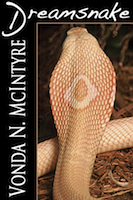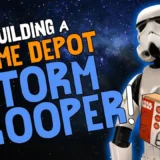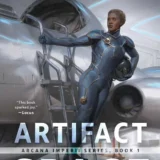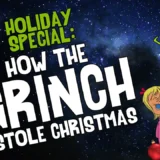Chain Mail is a telephone tag by email round-robin interview session with authors from the Book View Cafe writers collective. Images are links, connecting to biographical information about an author or more information on their current work. Additional information can be found on the contributors page.
Amazing Stories: The Google Book Settlement supposedly offered authors a way to earn on their works (through advertising) and offered wide distribution and immediacy in exchange for largely co-opting copyright. Ursula K. Le Guin (one of your members) came out strongly against it. Works would have been (freely) available to libraries, schools, etc, whereas now we have silly things like e-books that ‘time-out’ at the library. GBS was bad – but what’s the alternative?
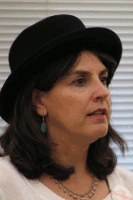
SUE LANGE
First off, the idea of my writing being paid for by accompanying advertising is distasteful. If that’s what the Google Settlement offered, then…eek. On the other hand, I wouldn’t turn down publication in the New Yorker, so what am I talking about? Something about Internet ads, though. They seem overwhelming compared to magazine ads. More in your face and hard to ignore. And ads on a page of a book? Yuck.
Second, Ursula objected to something very specific in the Settlement: the orphan clause. The one that stated if a copyright owner of a work could not be found and the book was out of print, the work would fall to the public domain. That is objectionable. Why is it so important that orphans be dealt with at all? Google can’t find the copyright owner? Big deal. It’s not a horrible loss if some work is not available via Google Books. We’ll survive until the author makes it out of the comfort room to sign on the dotted line.
Which brings me to my third point: the opt in/opt out choice. How annoying! I needed a lawyer just to figure out what the difference was. Seemed like either choice was wrong. What if your situation changes? Like one day you wake up to a chorus of angels and you finally understand the ramifications of the Google Book Settlement. Omigod, you made the wrong choice!
I can’t remember which I chose. To be honest the Settlement has little effect on my life. I make so little money from my intellectual property, it’s not worth quibbling over. However, there are writers who make a living through their writing. For them it’s different. They need to pay attention.
There is one thing Ursula mentioned in her blog posts on the subject that made me jump on her bandwagon. It’s her reaction to the Mickey Mouse clause of the copyright law. She dislikes it. Me too.
Lengthening the life of a copyright to 70 years beyond the life of the author (120 years for corporate authorship—why?) was a bit much. Hey I’m all for providing for heirs. Considering the difficult conditions of an artist’s life, there often isn’t much to pass on to their kids. But 70 years? How much time does junior need to get his own lemonade stand up and running?
Ursula felt that if the Mickey Mouse clause wasn’t so limiting, the whole orphan thing would go away. Material would fall into the public domain within a reasonable amount of time and the number of orphans out there would be too small to worry about. She’s right, but I doubt very much the Mickey Mouse clause is going to go away so we’re stuck with these “orphans.”
What is the alternative to the Google Book Settlement, then? I say live with the brats. Accept the fact of the orphans’ existence. It’s not the end of the world. If a work is truly important and the world demands it, then Google or some other entity should work hard to find the copyright owners. Of course, a really important book that the world wants would have that effort behind it no questions asked. So we’re probably talking about books that don’t have a large readership. How terrible is it if they don’t get digitized for a generation or two? IMHO.
![]()

CHRIS DOLLEY
Addressing the library part of the question, this is something that Book View Cafe is looking into. There are very real fears that publishers have about libraries loaning ebooks. The major fear is that if readers can download an ebook for free from a library, why would anyone ever want to buy a book? Borrowing a print book is different – you have to physically visit the library – but ebooks, you can download from anywhere – 24/7. And they don’t wear out.
Some publishers are so frightened of this that they’ve stopped selling ebooks to libraries, others have increased their ebook prices to over $100, or limited the number of times a book can be borrowed. We’ve taken a different approach. We offer a discount to libraries of up to 45% on our ebooks.
Why? Because a.) We believe passionately that libraries should be supported. My local library supported my reading habit for years when I couldn’t afford to buy books. Now it’s my turn to help them. b.) An author’s biggest fear is anonymity. By working with partner libraries we believe we can raise our member’s profiles. c.) The future is never as scary or as rosy as people think. Planning your current strategy on the assumption of a future Armageddon in book buying habits is crazy. A far more sensible approach is to be flexible and look to influence and take advantage of future possibilities, not to dictate terms, or pick up your books and walk away.
And there are plenty of alternative book lending models that do not lead to the death of publishing. I receive an annual PLR payment from UK libraries. I believe Public Lending Right is also used in Canada and Ireland. It’s a way of reimbursing authors by paying them a sum based on the number of loans of their books. Currently PLR is funded by government grant. There’s no reason this system couldn’t be funded by library subscription IF the number of library loans became a serious threat to the bookstores.
We’ve only just started our library initiative and already Book View Cafe supplies books direct to Douglas County Libraries in Colorado and Wheelers in Australasia. We plan to expand rapidly.
(passes) & Promo for up-coming question
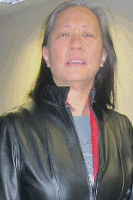
BRENDA CLOUGH
This is one of those issues where, like Bette Midler sings, ya gotta have friends. I know almost nothing about the Google settlement, and cannot spare the time to bone up on the subject. However, there are groups that can and do, particularly the Science-Fiction & Fantasy Writers of America. They’re running around researching, testifying, writing briefs, and in general keeping on top of the subject. I am a member and can count on them to figure out what the best thing is, and do it. They will let me know if effort on my part (probably whining to congresspersons) will be called for.
And, while I’m at it, I plan to pay someone to do my taxes, and have a professional with a shop full of the right tools to rotate my tires. There are Heinlein heroes, who can do everything – in novels. In real life, we delegate. Life is too short.
![]()
 DEBORAH J. ROSS
DEBORAH J. ROSS
is too busy writing to try to figure out the Google Settlement.
(Ed. Note: Which is of course its own statement about the settlement.)
![]()

KATHARINE ELISKA KIMBRIEL
I tried to fill out the paperwork for Google Settlement when I was ill, and failed miserably. I realized my only solution was to stay affiliated with writer organizations, have an Internet presence, and get my backlist into production in some form as quickly as possible. I confess, that’s why it all started. I was just busy writing away and went: “You’re going to declare my books orphaned? Wait a minute!”
So, Google — you radicalized me. Author Rights Now!
 PHYLLIS IRENE RADFORD
PHYLLIS IRENE RADFORD
My objection to the Google settlement was that it was negotiated by an organization I do not belong to and I was expected to accept their orders without question. They had no right to negotiate on behalf of the 90% of authors who do not belong.
On top of that, proof of copyright ownership fell to the author. Google took everything they wanted and would only give it up if we provided a ream of paperwork. I don’t think so.
Author Jay Lake uses the analogy that if he has a barbeque on his back deck he hasn’t used in 2 years doesn’t mean it’s free to anyone who wants to take it. Same with a book. It may be out of print or no longer available, that doesn’t mean it’s up for grabs.
Chris answered the library question very well.

VONDA N. MCINTYRE
Ursula’s Google (Un)Settlement page is at https://ursulakleguin.com/Index-GoogleSettlement.html and her petition is at https://ursulakleguin.com/GS-Petition.html
The orphan books question wasn’t the only problem with what Google wanted to do. It was a problem that being out of print (OP) was redefined to mean “in the public domain,” which it isn’t. But that wasn’t the only problem.
The worst problem with Google’s program was that you had to opt out of it. I’m not terribly prolific, but trying to claim my own work in the Google database was a nightmare. After spending a good deal of time and growing more and more resentful, I said to myself, “Self, I’m not doing this!” and opted out entirely.
oogle’s idea of making everything available to everyone under any and all circumstances might in theory have been a good idea, but I notice that their attempt to grab my work — some of which was OP (but not public domain) until Book View Café brought it back into print — was hardly the pure good-to-society effort that a lot of people made it out to be. They were planning to make a lot of money from it. Perhaps a bit might trickle down to the writers.
It’s funny how you get called a Communist if you suggest that maybe it isn’t fair that nearly all of the increase in the GNP over the last thirty years has gone to people who are already obscenely rich (as opposed to the people who have created the increase in productivity, which would be working class and middle class people with stagnant incomes).
But if you point out that you own a literary property, you’re accused of being a selfish greedy writer. Most writers aren’t rich, obscenely or otherwise, and most professional writers would like to be able to pay their bills. This is increasingly difficult in a world in which “We have to pay the printer more, we have to pay the distributor more, amazon.com wants a bigger discount on book prices, Google wants a share of your work without bothering to ask, we have to pay executives millions of dollars, give them millions of dollars of bonuses, give them millions of dollars of golden parachutes when they leave the company” results in “We’re paying the same advance for a first novel now as we paid in 1975.”
In 1975 I could live for a year on the $3500 that Fawcett Gold Medal paid me for The Exile Waiting.
Now, not so much.
![]()
 JUDITH TARR
JUDITH TARR
The Settlement does appear to be dead, thanks to various court rulings that point out that, you know, there is this thing called copyright, and it does not mean what Google thinks it means. They just want to share all of human literature! For free! And make millions off it.
As they all do. Facebook, for example. Pinterest, whose terms of service add up to, “All your content are belong to us.” Pirates in their fleets and legions, some of whom are actually charging users for their illegal downloads. It’s a constant game of whack-a-mole, and it never, ever stops.
I admit, in my innocence at the time, that I opted in to the Settlement, because if they were going to steal my work anyway, at least I’d get a pittance for it. Or maybe it wasn’t innocence but cynicism. I have never believed in Google’s motto, “Don’t be evil.” They’re just as evil as every other corporate entity. Corporations exist to make profits. Period. They will do this in any way they can get away with. Grand theft author? Why not? Most authors are too powerless, too naïve, or too dead to know the difference.
Except that, with the rise of the same social media that are becoming obscenely rich on our unpaid content, authors are better informed. And more powerful, which is a bit ironic but there you are. Knowledge is power.
And that is why I’m in favor of offering my BVC books to libraries. That’s my choice, I can opt in or opt out with complete freedom, and if readers like my work enough, they’ll click the link and buy it so they can keep it. I grew up in libraries, being a voracious reader with no budget, and I feel strongly that in doing this, I’m paying forward. Honestly? It geeks me out. My books! In libraries! It excites me beyond measure.
About the long term issue of ebooks never wearing out: I suspect there may be a term limit set on ebooks as time goes on. Whatever the life span of a library book is–five years? Ten? Offer a license, renewable at the end of that period. Libraries are replacing their physical books or else culling and disposing of them. I don’t see why ebooks couldn’t be set up to work the same way.
![]()
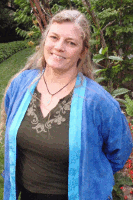
PATI NAGLE
The Google deal was a brazen attempt to grab the publication rights of thousands of authors. This is theft, folks. Had it succeeded, Google would have made millions at the expense of independent writers. I’m glad it failed. It frightened and confused a lot of authors. It infuriated me. I now avoid doing business with Google because of it.
We support libraries because libraries purchase the books they lend. They represent a source of income to us as well as a great tradition of making books available to those who can’t afford to buy them. Most of us have used and continue to use libraries. BVC’s work with libraries is an exciting development this year.
![]()
DAVE TROWBRIDGE
To me, it just more proof that Qoholeth was right: there is nothing new under the sun. Enclosure of the commons by the wealthy and powerful is an ancient struggle that will never cease. We won this round.
![]()
Linda Nagata, Linda Stevenson and Maya Kaathryn Bohnhoff chose to pass on this question.

Coming Up: Will the Amazing juggernaut roll over everything in publishing?
Steve Davidson is the publisher of Amazing Stories.
Steve has been a passionate fan of science fiction since the mid-60s, before he even knew what it was called.









